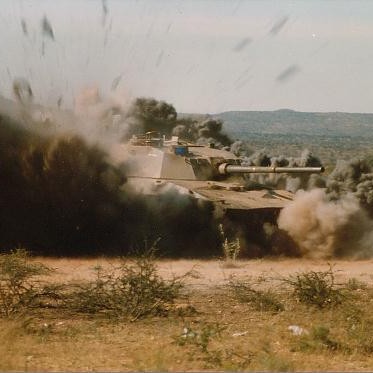Paratus Monograph 33: Russia’s Campaign Medal Confirms Invasion of Crimea
Russia has acknowledged invading Crimea.
Russia’s Vladimir Putin had consistently denied that his country had invaded the Ukrainian Autonomous Republic of Crimea. His official position has been that the people of Crimea had revolted against a fascist regime in Ukraine, and requested annexation by Russia. Russia had no responsibility for the events in the republic.
The facts do not support that denial.
Under the terms of agreements between Russia and Ukraine, Russia was permitted access to Sevastopol, and the right to maintain naval forces there, until 2045. The agreements provided that Russian military forces in Crimea would respect “the sovereignty of Ukraine, observing its laws and permitting no interference in the internal affairs of Ukraine”.
The 1994 Budapest Memorandum was the international agreement which underpinned the elimination of Ukraine’s nuclear arsenal. In return for giving up its nuclear weapons, Ukraine received security assurances from the USA, UK and Russia to protect Ukraine’s sovereignty and territorial integrity. The parties agreed not to use economic or other coercion or aggression against Ukraine, and agreed to assist the country in the event of outside aggression.
For several years Russia has been using economic coercion against Ukraine, in direct violation of the Budapest Memorandum.
On 21 February 2014 the corrupt president of Ukraine, Viktor Yanukovych, fled the country. This was welcomed by the majority of the people of Ukraine. Even members of Yanukovych’s own party voted to disown him. The Ukrainian parliament, the Verkhovna Rada, voted 338:0 (out of 447 deputies) on 22 February to set new presidential elections for 25 May. Parliament did not purport to remove Yanukovych, as is widely but incorrectly reported. It did pass a resolution that declared that Yanukovych “withdrew from his duties in an unconstitutional manner“, which he clearly had done, and voted to elect Oleksandr Turchynov as Chairman of the Verkhovna Rada and acting President and Prime Minister of Ukraine.
Shortly afterwards an extensive and well-organised Russian propaganda campaign began. The change of leadership in Ukraine was represented as a violent fascist coup by anti-Russian extremists. It was falsely suggested that Russian speaking residents of Crimea, and eastern Ukraine, were in danger.
In early March euphemistically described “pro-Russian militants” seized the Crimean parliament (the Supreme Council of Crimea), and other government and police buildings, set up roadblocks and besieged Ukrainian military and naval bases in Crimea. A leader of a tiny pro-Russian neo-Nazi group, Sergey Aksyonov, was “elected” prime minister of Ukraine by members of the Autonomous Republic’s parliament who were being held at gunpoint by the “militants”. It was widely believed, but never proven, that many of the ”militants” were actually Russian special forces.
Simultaneously Russian naval vessels prevented Ukrainian ships from leaving or entering port; and Russian marines and special forces assisted the pro-Russian militants to secure government installations. Large numbers of additional Russian troops entered Crimea. Whilst Russia claimed that these troop movements were consistent with theBbases Agreements, they were not. Not only did the incursion of additional troops violate the provisions relating to the numbers and movement of troops, but the purpose of their operations violated the fundamental commitment not to interfere in the internal affairs of Ukraine.
A referendum on annexation by Russia was hastily organised by the de facto government of Sergey Aksyonov. This resulted in an overwhelming vote for annexation. This result was not a surprise, due to a boycott by almost all opponents of independence, strident official pro-Russian propaganda, and vote-rigging by the new regime in Crimea. Following the vote, Russia almost immediately annexed the Autonomous Republic of Crimea.
It is clear that Russia had orchestrated the disorder and takeover in Crimea, and was directly responsible for the events leading up to the referendum. It had violated its commitments under the Budapest Memorandum, the Bases Agreements, and at international law to protect the sovereignty and territorial integrity of Ukraine, and not to interfere in the internal affairs of another country.
Ironically even if Russia had not been responsible for these events, it was still breaching its international commitments by annexing Crimea.
In a scene eerily reminiscent of Adolf Hitler visiting Sudetenland in September 1938, Vladimir Putin visited Crimea in May 2014. At a military parade in Simferopol World War Two veterans were joined by veterans of the “Liberation of Crimea“. The new veterans sported a fresh medal, issued by the Russian Federation’s Ministry of Defence. This is inscribed “For the return of Crimea 20.02.14 – 03.18.14.”
If Russia was not directly involved in the seizure of Crimea, why was a campaign medal issued? The issue of this medal by the Russian Ministry of Defence confirms Russia’s involvement in the annexation of Crimea, and that this was an official military operation.
More important is the dates on the medal. 20 February 2014 was the day before Viktor Yanukovych fled Ukraine, and before the Verkhovna Rada voted to appoint an acting president.
The issue of an official campaign medal has undermined Russia’s claim that it did not invade Crimea. Not only does the medal official effectively recognise that an invasion occurred, but it supports the supposition that the planning for that invasion began even before Russia’s corrupt ally Viktor Yanukovych fled Ukraine.
Text copyright Paratus Defence Analysts and Consultants Limited May 2014
Sources:
The Online Debate Over A Mysterious Russian ‘Medal’; Radio Free Europe Radio Liberty; 24 April 2014; http://www.rferl.org/content/the-online-debate-over-a-mysterious-russian-medal/25361367.html
Putin’s Crimean Medal of Honor, Forged Before the War Even Began, Will Cathcart, The Daily Beast, 25 April 2014; htttp://www.thedailybeast.com/articles/2014/04/25/putin-s-crimean-medal-of-honor-forged-before-the-war-even-began.html
Kyiv Post; 26 April 2014; http://www.kyivpost.com/content/ukraine-abroad/the-daily-beast-putins-crimean-medal-of-honor-forged-before-the-war-even-began-345284.html
Vladimir Putin makes triumphant visit to Crimea as “20 separatists killed’’ The Telegraph; 9 May 2014; http://www.telegraph.co.uk/news/worldnews/europe/ukraine/10820873/Vladimir-Putin-makes-triumphant-visit-to-Crimea-as-20-separatists-killed.html
Parade Ignores Carnage; New Zealand Herald, 11 May 2014; http://www.nzherald.co.nz/world/news/article.cfm?c_id=2&objectid=11253015
